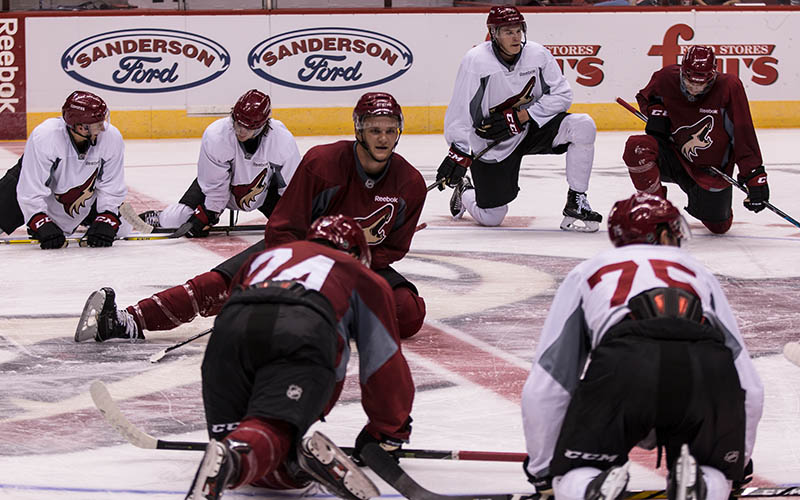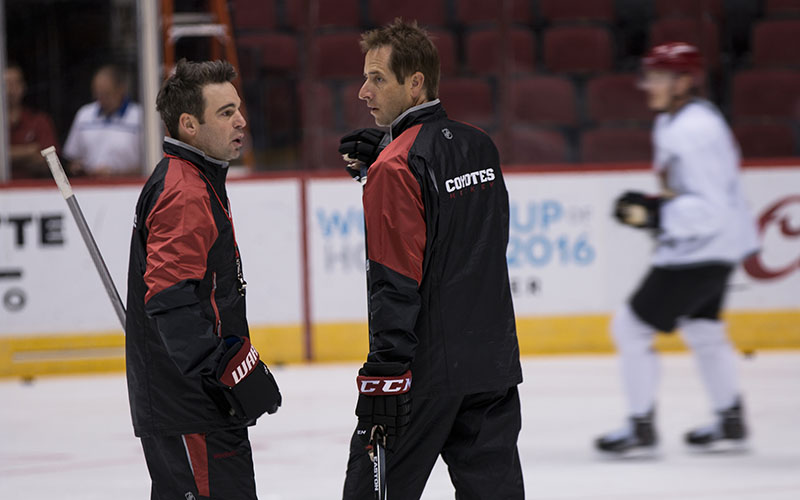
Prospects stretch after their ice session at the Coyotes development camp at Gila River Arena. (Photo by John Alvarado/Cronkite News)
GLENDALE — Coyotes Director of Player Development Steve Sullivan stood on the ice at Gila River Arena earlier this week just a few feet away from more than 40 Coyotes prospects at the team’s annual development camp.
Thanks to the arrival of the Coyotes’ new American Hockey League affiliate in Tucson, Sullivan will have plenty of additional opportunities to check in on the team’s future.
“With them being down the street, the accessibility to them for practices and games is so much more, so we’ll have a lot better handle on our prospects,” Sullivan said.
The Coyotes unveiled their new AHL affiliate, the Tucson Roadrunners, earlier this summer, and in doing so created a fairly rare dynamic between the two. Of the 30 teams in the NHL, Arizona is one of only seven to have its top minor league affiliate within 150 miles of the parent club.
“We feel pretty strongly that this is going to be a big part of our development process, not to say it wasn’t in the past, but it wasn’t as integrated as it needs to be,” Coyotes President and CEO Anthony LeBlanc said. “Our general manager, John Chayka, our head coach, Dave Tippett, this has been a really strong focus for them over the last couple of months.”
Leblanc estimated about 10 of the team’s former draft picks will play in Tucson next season. According to the website HockeysFuture.com, the Coyotes have the top prospect pool in the NHL.
“It’s an unbelievable opportunity for all our players to have access to NHL resources,” Chayka said. “That was the goal, to create a shared resource model between the teams.”
The most obvious advantage to having an affiliate in Tucson is its close proximity to the parent club’s home arena in Glendale, just a two-hour drive away.
In the last few years, the Coyotes AHL affiliate has bounced around the country, with homes in Portland, Oregon; San Antonio; Valley City, Utah; and Springfield, Massachusetts. Sullivan said having the team in Tucson will drastically increase the visibility of prospects throughout the organization.
“We can do some skill practices once or twice a week and work on their skills sets throughout the year,” he said. “Whereas before when they’re across (the) country, you go in for three four days, watch a couple games, then you leave.”

Coyotes Director of Player Development Steve Sullivan and associate coach Jim Playfair lead practice at the Coyotes development camp at Gila River Arena. (Photo by John Alvarado/Cronkite News)
Sullivan said Tippett, the team’s executive vice president and coach, didn’t get the chance to see even one of the Coyotes’ AHL affiliate’s games live when the team was in Springfield last season. He expects that to change this year.
One of Tippett’s former assistants on his Dallas Stars staff will lead the on-ice effort in Tucson. New Roadrunners head coach Mark Lamb spent seven seasons under Tippett in Dallas, an experience he plans to draw on going forward. Lamb said he’s already been impressed with the level of talent throughout the organization, and he plans to implement a system in Tuscon similar to the one already in place with the Coyotes.
“We’re going to have some high-end players down here that need to learn to play the same way as they’re doing up there,” Lamb said in a video interview provided by the Coyotes. “The transition when someone gets called up or sent down, the system and the base is all going to be the same … it just gives the kids a better chance to play better when they get called up.”
Sullivan said he speaks with both Lamb and Tippett on a daily basis to discuss player development throughout the organization.
With the new shared resource model now firmly in place, LeBlanc said he believes there’s a bright future for both teams.
“This is one of the aspects that gets people excited because they know we have a plan to develop our players properly, and that’s going to lead to a better team in future for the Coyotes,” LeBlanc said. “As long as we keep drafting the way we do, the Roadrunners are going to be one heck of a team, too.”